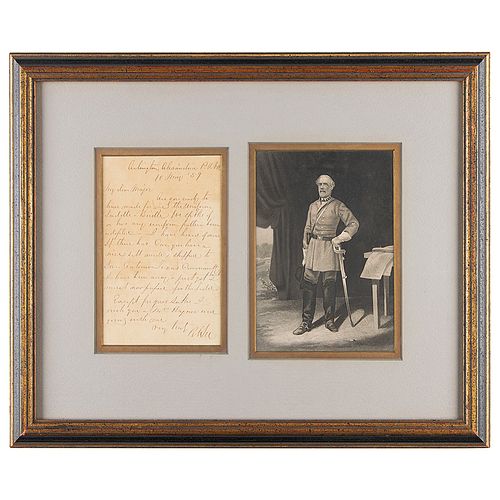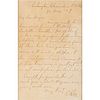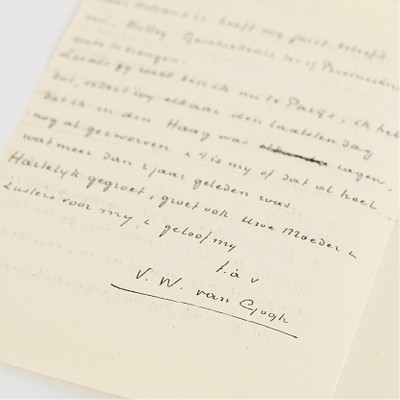Robert E. Lee Autograph Letter Signed
Two ways to bid:
- Leave a max absentee bid and the platform will bid on your behalf up to your maximum bid during the live auction.
- Bid live during the auction and your bids will be submitted real-time to the auctioneer.
Bid Increments
| Price | Bid Increment |
|---|---|
| $0 | $5 |
| $50 | $10 |
| $200 | $25 |
| $500 | $50 |
About Auction
Jun 15, 2022
RR Auction's June Fine Autograph and Artifact sale brings over 800 extraordinary items to the auction block, including: a four-page musical manuscript by Wolfgang Amadeus Mozart, containing four canons and an early autograph letter signed by the celebrated painter Vincent van Gogh. RR Auction support@rrauction.com
- Lot Description
ALS signed “R. E. Lee,” one page, 4.75 x 7.25, May 10, 1859. A handwritten letter to Major P. V. Hagner, addressed from the Arlington House in Alexandria County, Virginia. The nearly 640 acres of Arlington would later be established as the Arlington National Cemetery on May 13, 1864, almost five years to the day when this letter was written. In full: “Are you ready to have made for me the uniform saddle & bridle I’ve spoke of or has any uniform pattern been adopted—I have heard of none. If there has, can you have a nice sett made & shipped to San Antonio conveniently. I have been away & just got back & must now prepare for the field. Except for your sakes I wish you & Mrs. Hagner were going with me.” Attractively double-matted and framed with an engraving to an overall size of 19.25 x 15.25. In very good to fine condition, with light staining not at all affecting readability.
In 1855, Lee became a lieutenant colonel in the new 2nd Cavalry Regiment in Texas. His service was interrupted in 1857 when his father-in-law, George Washington Parke Custis, died and left Lee to settle his complicated and heavily indebted estate that included around 200 slaves and Arlington House in Alexandria County, Virginia. These pressing family affairs took two years to settle, during which time Lee was forced to take a leave of absence from his military post.
After about a year, Lee began to experience ‘some of the misgivings of a man long separated from his profession. His leave was to expire on December 1 [1858], but as that date approached, Lee realized that he could not quit Arlington with his work as executor half-done. He requested and was allowed an extension of his leave to May 1, 1859‰Û_Absence from his command troubled him deeply. He had hoped to return to his regiment on May 1, but he had to ask once again that his leave be prolonged, and on June 14 had it extended for four months more,’ (Lee, Freeman). This letter anticipates his imminent return to his Texas post, but not before, in October 1859, he was called to command the militia raid on abolitionist John Brown at Harper’s Ferry.
Much to his satisfaction, Lee returned to his post in San Antonio in February 1860. A year later, Texas seceded from the Union in February 1861 and Lee returned to Washington, in all likelihood riding on the very saddle and bridle mentioned above. He was promoted to colonel and offered the rank of major general in the fight against the seceding states, a proposition that troubled him greatly. Though opposed to secession, Lee’s fidelity to Virginia outweighed his loyalty to the Union, and in April 1861, he accepted command of Virginia’s Confederate forces, with the rank of general after the army’s formation, rising, eventually, to become its general-in-chief. - Shipping Info
-
Bidder is liable for shipping and handling and providing accurate information as to shipping or delivery locations and arranging for such. RR Auction is unable to combine purchases from other auctions or affiliates into one package for shipping purposes. Lots won will be shipped in a commercially reasonable time after payment in good funds for the merchandise and the shipping fees are received or credit extended, except when third-party shipment occurs. Bidder agrees that service and handling charges related to shipping items which are not pre-paid may be charged to a credit card on file with RR Auction. Successful international Bidders shall provide written shipping instructions, including specified Customs declarations, to RR Auction for any lots to be delivered outside of the United States. NOTE: Declaration value shall be the item’(s) hammer price and RR Auction shall use the correct harmonized code for the lot. Domestic Bidders on lots designated for third-party shipment must designate the common carrier, accept risk of loss, and prepay shipping costs.
-
- Buyer's Premium



 EUR
EUR CAD
CAD AUD
AUD GBP
GBP MXN
MXN HKD
HKD CNY
CNY MYR
MYR SEK
SEK SGD
SGD CHF
CHF THB
THB












